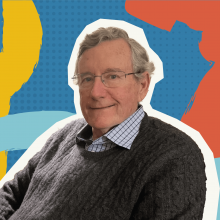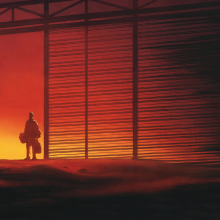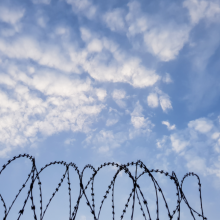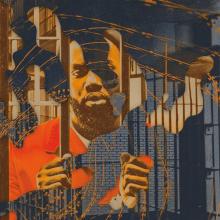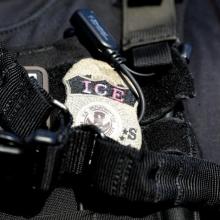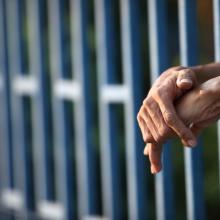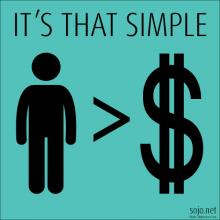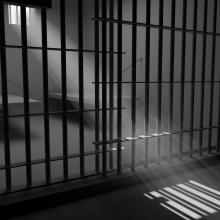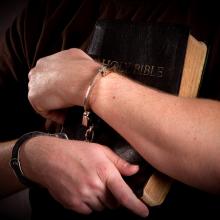prisons
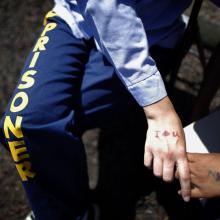
Amanda Johnson, 31, (L) holds hands with her son Mack Darbey, 10, of Sacramento at California Institute for Women state prison in Chino, California May 5, 2012. An annual Mother's Day event, Get On The Bus, brings children in California to visit their mothers in prison. Sixty percent of parents in state prison report being held over 100 miles (161 km) from their children. Picture taken May 5, 2012 REUTERS/Lucy Nicholson
At Lane Murray, where I’m incarcerated, a bureaucratic rule creates a peculiar dilemma for someone like me who finds truth and solace in both Christianity and Buddhism. The prison system demands I choose just one, but my soul refuses to be so neatly categorized. We’re also only allowed to change our religious affiliation once every six months. As if divine inspiration could ever follow an administrative calendar.
Anyone who has spent even a second in a prison knows it’s hell. Growing up in church, I noticed people who participated in the church’s prison ministry were both respected and feared. Respected because they were doing what the writer of Hebrews admonishes believers to do regarding those in chains: Remember them as though you were in prison with them (13:3). But they were feared because many of them had actually been in prison. Rather than the prison system or the criminal legal system being classified as barbaric, it was the prisoners who were typically understood to be barbarians.
Joe Ingle has spent a lot of time in prison. Ingle is a writer and death row minister who has been active in prison ministry since the ’70s. A native of North Carolina and a graduate of Union Theological Seminary, Ingle has dedicated his life to being present with and advocating for the 1.9 million people incarcerated in the U.S., especially the more than 2,300 incarcerated people on death row.
This article comes by way of Empowerment Avenue, a nonprofit that works to normalize the inclusion of incarcerated writers and artists in mainstream venues by bridging the gap between them as a path to decarceration and public safety. — The Editors
IN A DIMLY lit room, Noah sits hunched over his half-finished masterpiece. The canvas comes alive under his skilled hand, revealing the weathered face of an old field worker — the grandfather of a dear friend. Every stroke tells a tale of resilience, etching lines of wisdom and hardship that speak to a life often overlooked. As the evening unfolds, Noah’s focused concentration becomes a beacon, drawing curious onlookers who gather around to witness the birth of art.
This is how I think of Bonifacio Alcantar-Maldonado, who I know by his prison handle, “Noah.”
Known outside by his childhood nickname “Junior,” Alcantar-Maldonado is incarcerated at the Washington Corrections Center in Shelton, Wash., where I am serving a life sentence. His life is now defined by two cruel political realities — heartless immigration policies and harsh criminal laws. His story illustrates the waste of human potential by a politics that promotes fear of those struggling in other countries and at home.
The U.S. prison system is an afront to human dignity and in sharp contrast with God's vision for justice on earth. Christians' commitment to love, hope, and justice should inspire us to work toward abolishing the prison system.
AMERICAN HYPERPOLICING and mass incarceration are products of 50 years of cynical politics, vicious economics, and unconscionable racism—as the mass uprising in the wake of George Floyd’s killing has brought into ever clearer focus. Across the country, organizers on the ground are pushing to defund the police. Meanwhile, for people Left, Right, and center, “ending mass incarceration” has become a standard political talking point. But what precisely would “ending mass incarceration” entail?
Imagine that tomorrow we were to enact the most radical reforms to the prison system conceivable—reforms tailored to mass incarceration’s political, economic, and racial dimensions. First, to scale down the war on drugs, we could pardon every person in state and federal custody who is incarcerated solely on the basis of a nonviolent drug offense. Second, to stop caging people simply because they are poor, we could release every pretrial defendant who is sitting in jail solely because they are unable to make bail. Third, to end what’s been called the New Jim Crow, imagine if every Black state and federal prisoner—who constitute one-third of those in prison—were freed, regardless of whether they were guilty of a crime. By committing to these three measures (which, needless to say, aren’t being seriously considered in Washington or in any state capital), the U.S. would reduce its prison population by more than 50 percent, to a tick over 1 million people. In the COVID-era especially, when prisons and jails are incubators of the virus, many lives would be saved. Families would be reunited. Much suffering would be forestalled.
What such a robust menu of reforms would not meaningfully do, however, is end mass incarceration. Even at half its current size, the U.S. incarceration rate would remain three times that of France, four times that of Germany, and similar degrees in excess of where it was for the first three-quarters of the 20th century. Given the massiveness of the American carceral edifice, we cannot reform our way out of mass incarceration. Nor does the reformist impulse address the crux of the problem.
While many adjust to a new normal of isolation during the coronavirus pandemic, others are sounding the alarm, warning of the vulnerability of those in America’s prisons and jails.
“If I’m not speaking for the least and the last — and a large group of those are incarcerated people — then who will speak for them?” Rev. Dr. Kelle Brown of Plymouth United Church of Christ in Seattle, told Sojourners. “My solidarity most certainly must be attached to those who are most vulnerable.”
Kevin Landy, a former ICE assistant director responsible for the Office of Detention Policy and Planning under the Obama administration, said the move to house so many detainees at once in federal prisons was “highly unusual” and raises oversight concerns.
One in thirty-one. That’s how many Americans are in in jail, in prison, on probation, or on parole. In the U.S., our incarceration rate is 10 times higher than that of other countries while our actual crime rate is lower than those same countries. Citing a 600% increase in the prison population since the 1960’s, with no correlating increase in crime, Michelle Alexander has called mass incarceration “the new Jim Crow.” When people of color represent 30% of the U.S. population, but 60% of those incarcerated, we are in league with David, staring at a towering giant, armed with a prayer and a handful of stones.
While the work before us is daunting, people of faith are called to fight giants. The Spirit who we remember in Pentecost, the Spirit who set the world on fire, has trusted us with this work. We are giant slayers, by God’s grace. For this reason, it is fitting that we revisit the story of the first giant slayer, a young boy who tended sheep and fought off bears and lions.
1. Awakening:
It is impossible to build a transformative movement for justice if people remain in the dark about the magnitude of the crisis at hand, its origins, and its racial, economic, and political dimensions. I wrote The New Jim Crowbecause I strongly suspected that most people simply had no idea what was really going on and that education was a necessary prerequisite to effective action. I still believe that’s the case, and so urging people of faith and conscience to commit themselves to raising the consciousness of their congregations and communities is extremely important.
Encourage people to hold study groups, film screenings, public forums, and dialogues to help others awaken to what has happened on our watch and become motivated to join the movement. The Unitarian Universalists, the Samuel DeWitt Proctor Conference, Veterans of Hope, and PICO are all engaged in consciousness-raising work and have created study guides based on The New Jim Crow and other resources.
2. Building an Underground Railroad:
Obviously, consciousness-raising is not enough—we will have to get to work. In my view, that necessarily involves building an “underground railroad” for people trying to make a break for true freedom in the era of mass incarceration and who desperately need help finding shelter, food, work, and reunification with their families.
Putting Americans behind bars is becoming an increasingly lucrative business.
Living in poverty has always been a struggle, but in Alabama being poor could land you in prison. According to a recent story in The New York Times, Alabama resident Gina Ray was locked up for over a month because she couldn’t pay fees and fines related to minor traffic offenses. Speeding while poor shouldn’t land someone in jail. This punishment doesn’t fit the crime.
Why would such morally outrageous penalties be imposed for such minor violations? Because criminal justice has become big business. Private companies are making millions of dollars running prisons, administering probation systems, and providing health care to those living behind bars.
Jesus coupled himself with the least in society when he said: “I was in prison and you came to me” (Matthew 25:36 ESV). It’s no surprise: imprisonment was not unheard of for the early church. Paul penned many New Testament letters while he was in custody.
And Psalm 102 reminds us that God’s heart goes out to the interned. “From heaven the Lord looked at the earth, to hear the groans of the prisoners, to set free those who were doomed to die.”
A concerning trend of late has been the growth of “for profit” prisons. Spearheaded by companies like Corrections Corporation of America (CCA), the goal is to relieve states of the job of running prisons. Almost half of American prisoners are currently held in privately run prisons.
Religious conversions are on the rise in American prisons, according to a recent national survey of chaplains by the Pew Forum on Religion and Public Life.
A majority of 730 chaplains surveyed say that inmates are switching religions a lot (26 percent) or some (51 percent, and the largest gains are Muslim (51 percent), Protestant (47 percent) and pagan or earth-based religions (34 percent).
But it is difficult to determine prisoners' motivations for converting, according to Cary Funk, senior researcher for the Pew Forum.
“Some of the switching may be short-lived,” Funk said, adding that it is unclear whether the conversions are based on authentic beliefs or access to certain privileges such as special food or religious holidays.
The fight against mass incarceration is joined by an emerging faith-based movement.
For an entire week now we've watched tens of thousands of Egyptians march demanding a change in government. The police force has collapsed. The army is out in force. Residents are policing their own neighborhoods. President Mubarak is weighing his options. And the West is wondering what will happen next.
